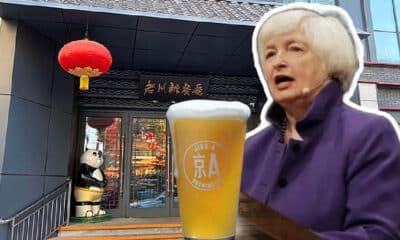China World
Meng Wanzhou “Back to the Motherland,” Michael Kovrig and Michael Spavor Return to Canada
Meng Wanzhou is coming home to China.
Published
3 years agoon

Meng Wanzhou (孟晚舟) is coming home to China. It has been nearly three years since the CFO of Huawei, and the daughter of Huawei founder Ren Zhengfei (任正非), was first detained in Canada during transit at Vancouver airport at the request of United States officials.
Meng Wangzhou was accused of fraud charges for violating US sanctions on Iran. Ever since late 2018, Chinese officials have been demanding Meng’s release and called the arrest “a violation of a person’s human rights.” Meng was under house arrest in Vancouver while battling extradition to the United States.
At the same time, in December of 2018, Canadian national Michael Kovrig was detained in the Chinese capital by the Beijing Bureau of Chinese State Security. Kovrig, who is known as Kang Mingkai (康明凯) in Chinese, served as a diplomat in Beijing and Hong Kong until 2016, and then became a Hong Kong-based Senior Adviser at the International Crisis Group, where he worked on foreign affairs and global security issues in Northeast Asia.
Kovrig was accused of espionage in China, although many called the arrest a case of “hostage diplomacy” (“人质外交”). In late 2018, Kovrig’s case went trending on Chinese social media. Although many online discussions were censored, popular comments said: “You take one of ours, we take one of yours” (more here).
Also detained in December of 2018 was the Canadian Michael Spavor (迈克尔‧斯帕弗), a China-based consultant and director of Paektu Cultural Exchange, an organization promoting investment and tourism in North Korea. In August of this year, a Chinese court sentenced Spavor to 11 years in prison after declaring him guilty of spying, while Kovrig had still been awaiting a verdict in his case.

Michael Spavor (left) and Michael Kovrig (right).
Now, as announced by Canadian PM Trudeau on Friday night, the two Michaels and Meng are free and on their way home. Meng was discharged by the Supreme Court in British Columbia after an agreement was reached with American authorities to resolve the criminal charges against her. While Meng boarded a flight to Shenzhen, Kovrig and Spavor were heading back to Canada.
On the Chinese social media platform Weibo, Meng’s return to China became the top trending topic of the day. “Meng Wanzhou About to Return to the Motherland” became the no 1 hashtag (#孟晚舟即将回到祖国#), receiving 1.5 billion views by Saturday afternoon (CST).
State media outlet People’s Daily was one of the main accounts pushing hashtags related to Meng. They also released the hashtag “Meng Wanzhou Just Updated her Moments” (#孟晚舟刚刚更新朋友圈#), referring to a social media post by Meng on WeChat, in which she wrote that she was on her way home to China and just crossing the North Pole, adding “under the leadership of the Communist Party of China, our motherland is becoming glorious and flourishing; without a strong motherland, I would not have had my freedom today.”
State media also issued online images featuring Meng, welcoming her back home after 1028 days.
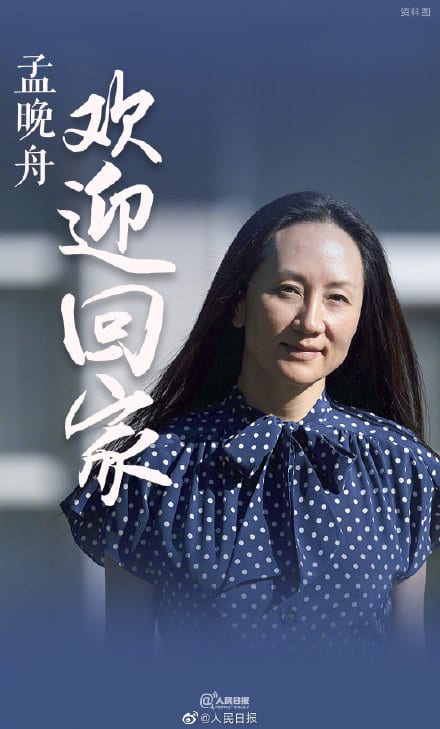
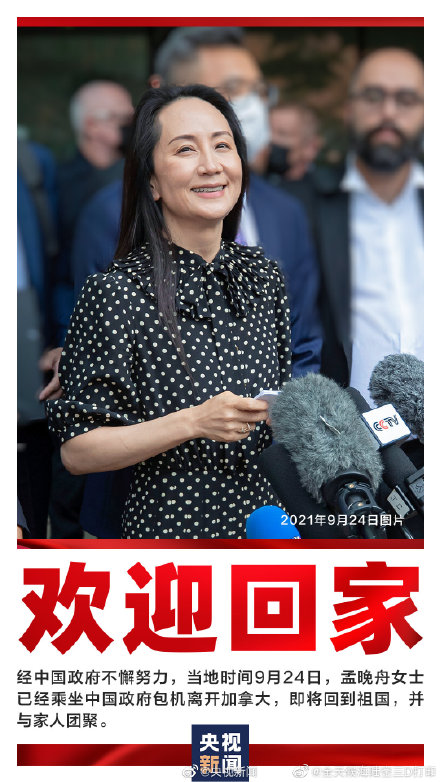
While Meng’s return triggered thousands of posts and comments on Weibo, the release of Kovrig and Spavor did not get nearly as much attention on Chinese social media – it also was not reported on social media by any Chinese official media accounts at time of writing.
In some online discussions on Weibo, commenters called the release of Kovrig and Spavor an “exchange” or “a business deal,” with others writing: “This is better, as long as Meng returns home, it’s alright.”
Meng Wanzhou’s detainment became one of the biggest topics on Chinese social media back in 2018, and it sparked anti-American sentiments – many netizens expressed how the United States was allegedly using the judicial system in a battle that was actually all about politics.
A political satire image of Meng Wanzhou being rescued by the Chinese authorities as an American shark is trying to eat her alive also circulated on Chinese social media this weekend. The image (“归舟”) was created and posted by digital artist Wuheqilin (乌合麒麟), who also welcomed Meng back home.

Meanwhile, some social media users in China have started a countdown to Meng’s arrival, tracking the flight on live tracking maps. Her CA552 plane is scheduled to arrive in Shenzhen at 21:14 local time, September 25.

By Manya Koetse (@manyapan)
Spotted a mistake or want to add something? Please let us know in comments below or email us. First-time commenters, please be patient – we will have to manually approve your comment before it appears.
©2021 Whatsonweibo. All rights reserved. Do not reproduce our content without permission – you can contact us at info@whatsonweibo.com.
Manya Koetse is the founder and editor-in-chief of whatsonweibo.com. She is a writer, public speaker, and researcher (Sinologist, MPhil) on social trends, digital developments, and new media in an ever-changing China, with a focus on Chinese society, pop culture, and gender issues. She shares her love for hotpot on hotpotambassador.com. Contact at manya@whatsonweibo.com, or follow on Twitter.

Also Read
China Food & Drinks
Where to Eat and Drink in Beijing: Yellen’s Picks
From Yunnan classics to fusion cuisine, these are Janet Yellen’s picks for dining and drinking in Beijing.
Published
1 week agoon
April 11, 2024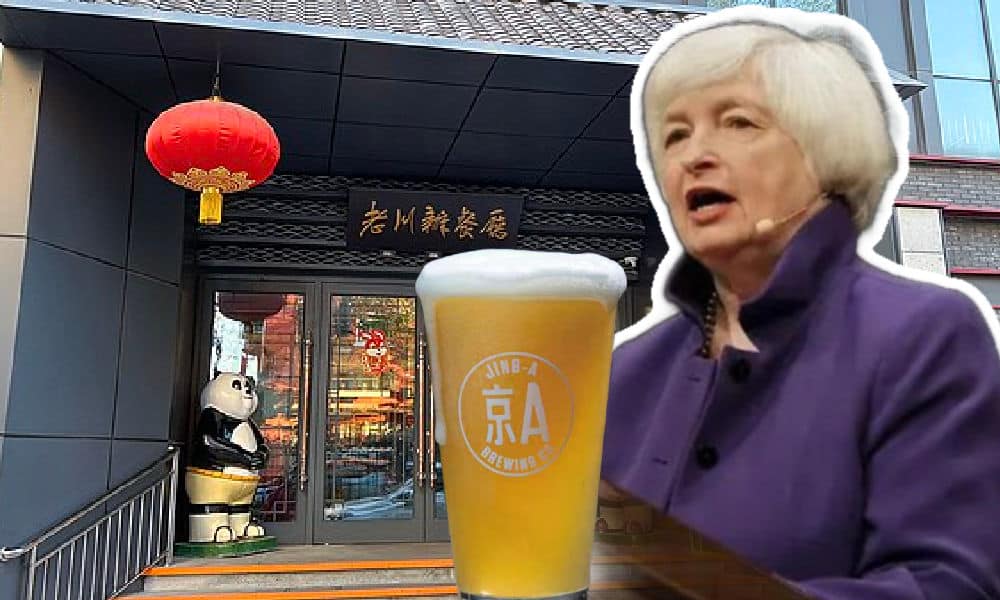
Janet Yellen, the United States Secretary of the Treasury, seems to have some excellent advisors, at least when it comes to choosing spots for food and drinks in Beijing.
Yellen just concluded her second trip to Beijing within a year, and once again, it’s not her official talks but rather her choices in food and drink venues that are sparking discussion on social media.
Her initial visit to Beijing was in July 2023, during which she held meetings with Chinese Premier Li Qiang and other officials.
This time, from April 4th to 9th, Yellen’s agenda included engagements with top Chinese officials in both Guangzhou and Beijing. The primary focus was on addressing ongoing bilateral tensions and managing trade relations between the US and China. In addition to official meetings, Yellen also met up with students and business leaders.
Yellen’s selection of bars and restaurants drew interest online. Yellen is known to be a food enthusiast, and likes to visit local restaurants wherever she goes.
In Guangzhou, Yellen dined at Taotaoju (陶陶居), a renowned Cantonese restaurant where she had roast goose and shrimp dumplings.
If you’re curious about the places she visited in Beijing during her first and second trip, check out our short ‘Yellen’s Beijing’ list below.
‘In & Out’ Yunnan Restaurant
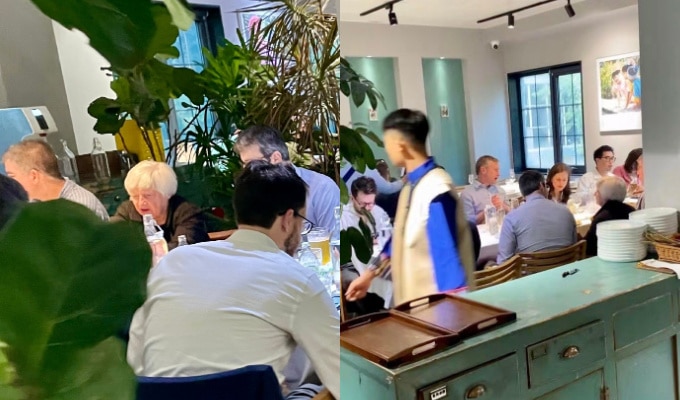
Yellen at Yizuo Yiwang, photos via Weibo.
● Name: ‘In and Out’ in English, Chinese name: Yī Zuò Yī Wàng 一坐一忘
● Specialty: Yunnan cuisine
● Notable: Yellen visited this local favorite near Beijing’s embassy area in the summer of 2023. Among other things, Yellen was served spicy potatoes with mint and stir-fried mushrooms, leading to online jokes about how the food would affect her. The mushroom dish that she had is called jiànshǒuqīng (见手青), which literally means “see hand blue”, in reference to turning blue when handled. It is the lanmaoa asiatica mushroom species that grows in China’s Yunnan region known for its hallucinogenic properties (when treated and cooked properly, they don’t cause hallucinations read more here). After Yellen’s visit, ‘In & Out’ used it as part of their marketing strategy and the restaurant released a special ‘Treasury Menu’ (or ‘God of Wealth’ Menu 财神菜单), promoting themselves as the first place where Yellen had dinner during her Beijing visit.
● Price: Dishes range from 38 yuan ($5) to 298 yuan ($41)
● Address: Chaoyang, Sanlitun Beixiaojie 1 / 朝阳区三里屯北小街1号
Grand Hyatt’s ‘Made in China’
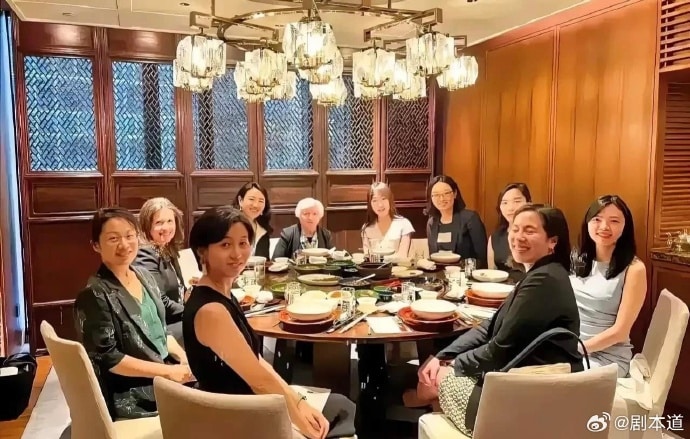
Yellen’s lunch at the Grand Hatt, image via Weibo.
● Name: ‘Made in China’ in English, Chinese name: Cháng’ān Yī Hào 长安壹号餐厅
● Specialty: Northern Chinese cuisine, including Peking duck / Fusion
● Notable: This is the venue where Yellen had lunch with a group of female economists and entrepreneurs in July of 2023 (you can see the speech she gave during lunch here). She apparently likes this restaurant a lot, since she visited it again for dinner on April 8 of this year. For her 2023 lunch, we know that Yellen ordered steamed fish head with chopped pepper (剁椒鱼头). The famous Hunan dish was among the most expensive dishes on a special menu (850 yuan/$117) for Yellen’s visit at the time. This time around, she also had Peking Duck. The award-winning Made in China restaurant, which is simply called “Chang’an no 1” in Chinese (after its address, 长安壹号餐厅), has been around for two decades, and the Beijing head chef Jin Qiang has been there from the start – he has since welcomed numerous heads of state and government leaders from around the world.
● Price: Appetizers start from 58 yuan ($8), seafood dishes around 500 yuan (69 yuan), Peking Duck 388 yuan ($53)
● Address: Grand Hyatt, Dongcheng, 1 East Chang’An Avenue / 东长安街1号东方广场
Lao Chuan Ban
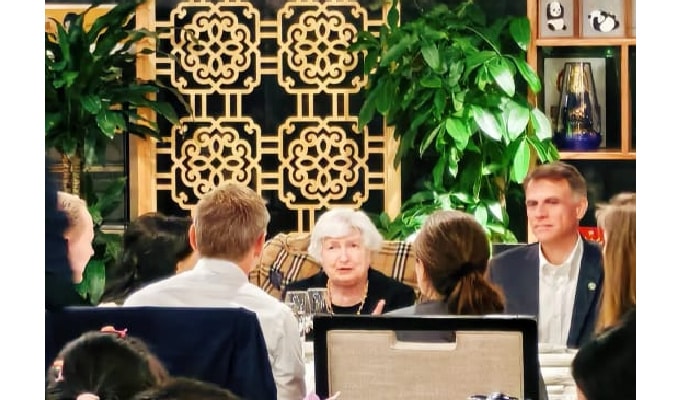
Yellen at Chuan Ban, image via Dianping.
● Name: Chuan Ban, Chinese name: 川办餐厅 aka ‘Lao Chuan Ban’ (Old Chuan Ban 老川办)
● Specialty: Sichuan food
● Notable: Chuan Ban, established as part of the Sichuan provincial government office and open to the public since 1995, is renowned for its authentic Sichuan cuisine. During her visit to Beijing, Yellen and her group dined at this famous restaurant on April 6 this year. They enjoyed a variety of dishes including Mapo tofu (麻婆豆腐), Sichuan-style cold noodles (四川凉面), clear noodles in chili sauce (川北凉粉), smashed cucumber salad (拍黃瓜), and Zhong dumpings in spicy sauce (钟水饺).
● Price:Dumplings for 18 yuan ($2.5), beef noodles for 16 yuan ($2.2), salt and pepper shrimp for 46 yuan ($6.3), fried lamb chops for 188 yuan ($26) – there’s something for everyone in different price ranges.
● Address: Dongcheng, 5 Gongyuan Toutiao, Jianguomennei Dajie / 东城区建国门内贡院头条5号
Jing-A Brewery
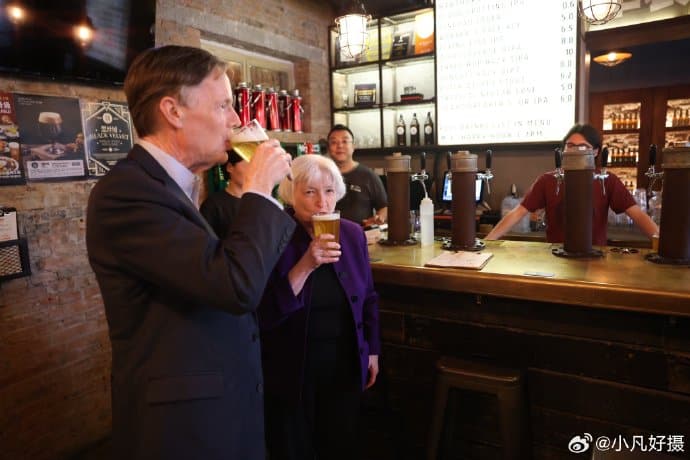
Yellen having a beer, image via Weibo.
● Name: Jing-A Brewery, Chinese name: 京A
● Specialty: Craft beer
● Notable: After five days of meetings during her 2024 China visit, Janet Yellen enjoyed a beer together with US ambassador Nicholas Burns at Jing-A, a brewery founded by wo Beijing-based American friends in 2012. In one of her tweets, Yellen explained that the microbrewery imports American hops for their beers — “a small representation of how the U.S.-China bilateral economic relationship can benefit both sides” (link).
● Price:Beers starting at 35 yuan ($4.8), snack dishes starting at 58 yuan ($8)
● Address: Jing-A Brewpub Xingfucun, Chaoyang, 57 Xingfucun Zhong Lu, Chaoyang, Beijing / 朝阳区幸福村中路57号
By Manya Koetse
Independently reporting China trends for over a decade. Like what we do? Support us and get the story behind the hashtag by subscribing:
Spotted a mistake or want to add something? Please let us know in comments below or email us. First-time commenters, please be patient – we will have to manually approve your comment before it appears.
©2024 Whatsonweibo. All rights reserved. Do not reproduce our content without permission – you can contact us at info@whatsonweibo.com.
China Media
Party Slogan, Weibo Hashtag: “The Next China Will Still Be China”
The “next China” phrase has become part of Party jargon without being clearly defined, leaving it open to various interpretations.
Published
1 month agoon
March 11, 2024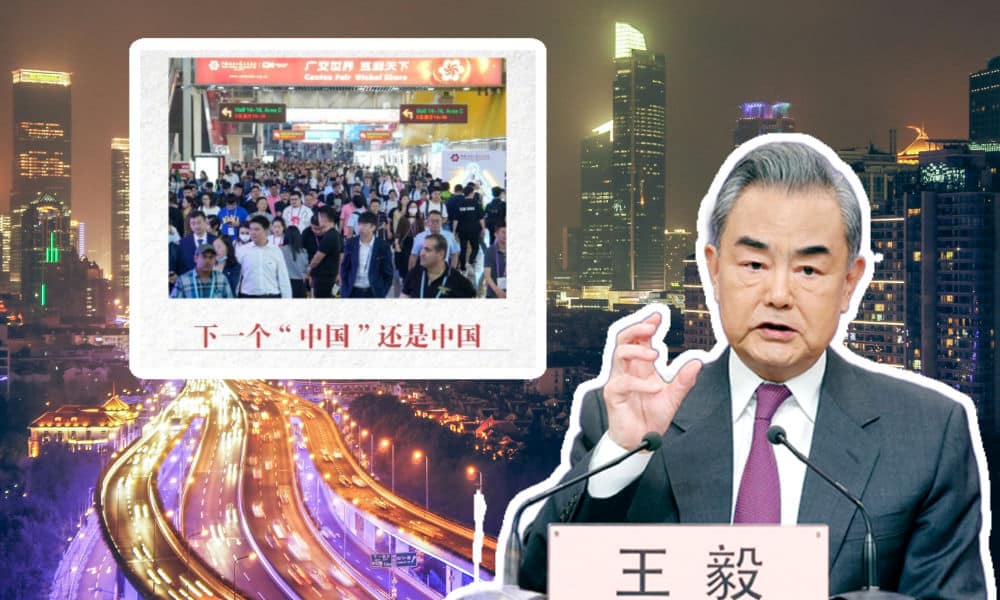
After Wang Yi’s remarks during his Two Sessions press conference, the sentence ‘the next China will still be China’ has solidified its place as a new catchphrase in the Communist Party jargon. But what does it actually mean?
Over the past week, the Two Sessions have dominated news topics on Chinese social media. On March 7, a hashtag promoted by Party newspaper People’s Daily became top trending: “Wang Yi Says the Next China Will Still Be China” (#王毅说下一个中国还是中国#).
The hashtag refers to statements made by China’s Foreign Minister, Wang Yi (王毅), also member of the Political Bureau of the Communist Party of China Central Committee, during a press conference held alongside the Second Session of the 14th National People’s Congress.
In his opening remarks to Chinese and foreign media, Wang emphasized that China’s role in a time of geopolitical unrest and shifting international relations will be one of peacekeeper, pillar, and progressor.

The Wang Yi quote is promoted by ChinaDaily on social media.
Wang’s comment about “next China” was a response to a question about China’s economic development, modernization, and diplomacy strategies. Wang replied that China remains a vital engine of growth. His comment that “the next China is still China” appeared to highlight China’s enduring importance on the world stage despite ongoing changes domestically. Wang mentioned the emergence of new industries, businesses, and increased international engagement as evidence of China’s ongoing evolution.
Wang also warned that “expressing pessimistic views about China will inevitably backfire, and misjudging China will result in missed opportunities” (“唱衰中国必将反噬自身,误判中国就将错失机遇”).
However, he did not elaborate on the specific meaning of his “next China” phrase, which is typical for Communist Party catchphrases and slogans that can often be interpreted in various ways across different contexts.
The “Next China Will Still Be China” Phrase
The phrase “the next China will still be China” has become more prominent in Chinese state media, from Xinhua to CCTV, since November 2023.
President Xi Jinping first introduced it during the San Francisco APEC Economic Leaders’ Week, stating that “China has already become synonymous with the best investment destination; the next ‘China’ is still China” (“中国已经成为最佳投资目的地的代名词,下一个‘中国’,还是中国”). The quote had previously come up in various investment and business communities.
The quote gained further traction when CCTV turned it into a hashtag on Weibo, emphasizing the message of “choosing China is choosing the future (“#下一个中国还是中国#, 选择中国就是选择未来”). It was also used by Ministry of Foreign Affairs spokesperson Wang Wenbin during one of the regular press conferences.
The slogan was also the central theme of a recent speech held by academic and China expert Martin Jacques for the state media initiated TED-like ‘China Talk’ series. Jacques’ talk, simply titled “The next ‘China’ is still China,” reflects on China’s transformation over the past 75 years from poverty to a global leading economy. Jacques emphasizes China’s unique ‘civilizational roots’ and its different approach to modernization compared to the West, which consists of nation states. He asserts that despite all the major transformations China has seen and is about to see, China’s fundamental characteristics will remain unchanged, rooted in its “civilizational template,” such as the relationship between state and society, the role of the family, and more.
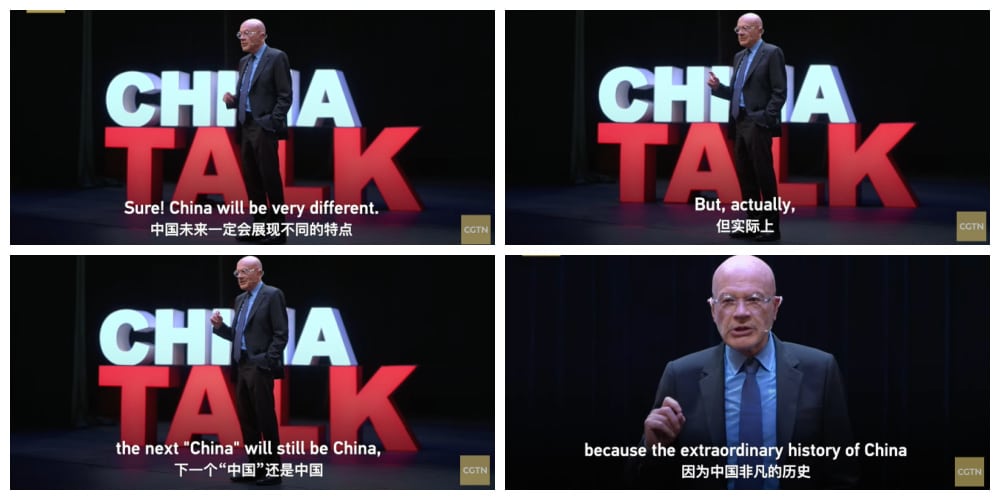
In this speech, promoted by state media over the past two weeks, “the next China is still China” signifies that despite China’s changing role in the world, its core essence, approach, and identity as a civilization remain unchanged. On Weibo, some commenters understand the sentence in a similar way, stressing that China will not betray its roots and turn into “the next America.”
However, in other contexts, the phrase is mostly used with a greater emphasis on the economy.
For instance, in Qiushi/Qs Theory, the Party’s theoretical magazine, the quote was called “an important conclusion,” highlighting “the profound capacity of China’s economy” and echoing the “general consensus of the international community.” The Qiushi publication by Shen Dan (沈丹) uses the exact same words as those employed by Wang Yi, indicating that “China remains the largest engine of global growth” (“中国仍是全球增长的最大引擎”).
While not explicitly stated, the sentence and its context serve to counter popular foreign media headlines suggesting that China’s remarkable economic development has ended and that “India is the next ‘China'” or that “Vietnam is the next ‘China’.” Instead, it suggests that China’s economic miracle will continue.
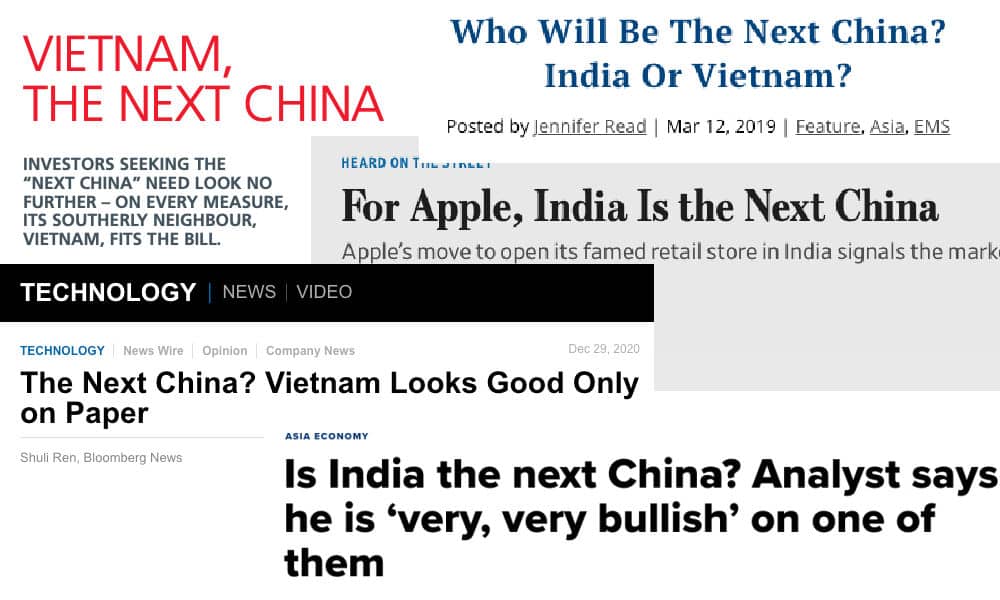
Various headlines in foreign media.
The phrase carries significant weight in the message it conveys both domestically and internationally. On one hand, it serves as a strategy to push back against negative foreign sentiment regarding China and pessimistic views on the economy. On the other hand, it sends a strong signal to Chinese consumers and businesses, encouraging confidence in the domestic economy and the future of China.
Part of Xi’s Catchphrase Canon
The “next China is still China” catchphrase stands as another slogan representing Party language and can be added to the long list of Xi Jinping’s ‘hot’ phrases (热词).
In January of this year, The Economist noted that the latest Communist Party phrases and slogans set the tone for economic campaigns and even define entire epochs of growth. They commented: “At a time when China’s leaders are attempting to drag the economy from the doldrums, there is even more reason than normal to pay attention to party-speak.”
The article describes how some phrases that come up in Xi’s speeches, especially those stressing China’s important role in the world and the country’s rapid economic growth, become part of Party jargon and are commonly used in local documents as political buzzwords. One well-known example is “Great changes unseen in a century” (“百年未有的大变局”), which entered the Party lexicon in 2017, when then-State Councillor Yang Jiechi described it as a guiding principle of Xi Jinping Thought on Diplomacy.
State media, both in Chinese and English, play a crucial role in propagating these types of popular phrases, incorporating them into various articles, videos, hashtags, and headlines.
But despite its current ubiquity and various ways to understand the “next China” slogan, not all netizens are confident that its meaning holds true. One top comment on Douyin said: “China’s birth rates have already fallen to some of the lowest globally, which doesn’t bode well for the future at all.”
However, others are more optimistic, believing that China will remain true to its essence and that its success cannot be copied thanks to the nature of Chinese people: “Hard-working, brave, energetic – that is what defines the Chinese people and that is what can never be replicated.”
By Manya Koetse
With contributions by Miranda Barnes
References
Shen Dan 沈丹. 2024. “The Next “China” Is Still China” [下一个“中国”,还是中国]. Qiushi, February 1 http://www.qstheory.cn/dukan/qs/2024-02/01/c_1130069314.htm [March 11, 2024].
The Economist. 2024. “A Guide to the Chinese Communist Party’s Economic Jargon.” The Economist, January 11 https://www.economist.com/finance-and-economics/2024/01/11/a-guide-to-the-chinese-communist-partys-economic-jargon [March 11, 2024].
Featured Image
Background photo by David Veksler on Unsplash
Get the story behind the hashtag. Subscribe to What’s on Weibo here to receive our newsletter and get access to our latest articles:
Spotted a mistake or want to add something? Please let us know in comments below or email us. First-time commenters, please be patient – we will have to manually approve your comment before it appears.
©2024 Whatsonweibo. All rights reserved. Do not reproduce our content without permission – you can contact us at info@whatsonweibo.com.
Subscribe

Zara Dress Goes Viral in China for Resemblance to Haidilao Apron

“Old Bull Eating Young Grass”: 86-Year-Old Chinese Painter Fan Zeng Marries 36-Year-Old Xu Meng

Chengdu Disney: The Quirkiest Hotspot in China

Where to Eat and Drink in Beijing: Yellen’s Picks

Weibo Watch: Burning BMWs

The ‘Two Sessions’ Suggestions: Six Proposals Raising Online Discussions

A Snowball Effect: How Cold Harbin Became the Hottest Place in China

Jia Ling Returns to the Limelight with New “YOLO” Movie and 110-Pound Weight Loss Announcement

Top 9 Chinese Movies to Watch This Spring Festival Holiday

Party Slogan, Weibo Hashtag: “The Next China Will Still Be China”

From Pitch to Politics: About the Messy Messi Affair in Hong Kong (Updated)

Weibo Watch: Frogs in Wells

Looking Back on the 2024 CMG Spring Festival Gala: Highs, Lows, and Noteworthy Moments

Two Years After MU5735 Crash: New Report Finds “Nothing Abnormal” Surrounding Deadly Nose Dive

More than Malatang: Tianshui’s Recipe for Success
Get in touch
Would you like to become a contributor, or do you have any tips or suggestions? Get in touch here!
Popular Reads
-

 China Insight1 month ago
China Insight1 month agoThe ‘Two Sessions’ Suggestions: Six Proposals Raising Online Discussions
-

 China Insight3 months ago
China Insight3 months agoA Snowball Effect: How Cold Harbin Became the Hottest Place in China
-

 China Arts & Entertainment3 months ago
China Arts & Entertainment3 months agoJia Ling Returns to the Limelight with New “YOLO” Movie and 110-Pound Weight Loss Announcement
-

 China Arts & Entertainment2 months ago
China Arts & Entertainment2 months agoTop 9 Chinese Movies to Watch This Spring Festival Holiday


